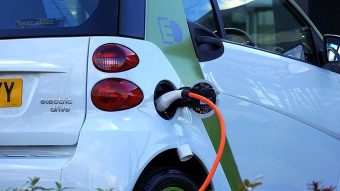
The government of India has agreed to purchase 10,000 new electric vehicles from India’s Tata Motors as part of a bid to replace the diesel- and petrol/gas-powered cars currently used by government agencies there, a public statement has revealed.
This purchase agreement will play out over the next 3 to 4 years, according to the government statement.
It should be remembered here that India’s government is massive. As it stands, there are more than 500,000 vehicles in use by various government agencies in the country. So, while the purchase of 10,000 electric vehicles (EVs) is certainly nice, there’s still quite a lot more to be done. If the country’s substantial and growing air pollution problems are going to be dealt with, the government should be coming out with much bigger announcements soon.
“Tata Motors will supply the cars in two phases starting in November. Nissan and India’s Mahindra & Mahindra had also bid for the contract,” Reuters notes.
“India wants to promote the use of electric vehicles to curb carbon emissions and energy demand. The federal think tank in May laid out a 15-year roadmap for electrifying all new vehicles by 2030 and limiting the registration of petrol and diesel cars. Electric vehicles remain expensive due to the high cost of batteries and automakers say lack of charging stations could make the plan unviable.”
While the lithium-ion automotive battery expanse issue is likely to “solve” itself over the coming decade as the sector develops, India will have to solve the EV charging station shortage problem itself if those plans are to be achieved.
For some more context on the news, as you might recall, Tata Motors joined the RE100 initiative last year. More notably, India has a goal of becoming the first 100% electric vehicle country. On that topic, CleanTechnica Director Zach Shahan wrote in June:
Last year, when I presented* at a big institutional investment conference in India, there was a lot of talk about solar, but little about electric vehicles. Of course, a large portion of my presentation was about Tesla and electric cars. The presentation* from Indian Minister of Coal, Power, and New & Renewable Energy, Piyush Goyal, highlighted the highly competitive cost of solar power but didn’t really touch electric vehicles.
But something must have been brewing (or inspired there at the conference), because Mr. Goyal announced a month later that India was working on a plan to make every vehicle in the country electric by 2030 (that excludes planes, of course), and that plan has been reiterated since then.
Source: cleantechnica.com/

